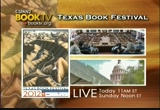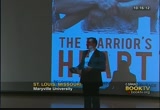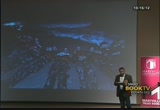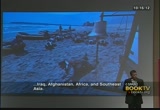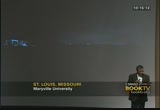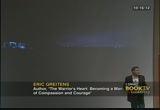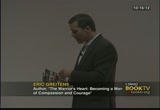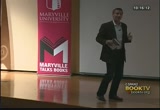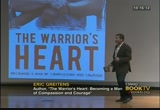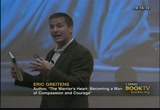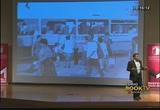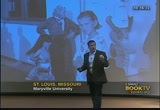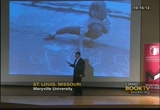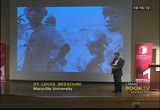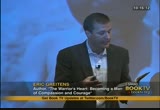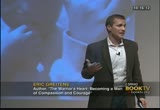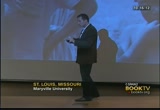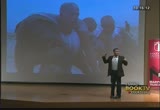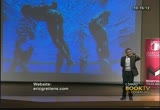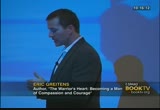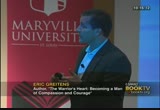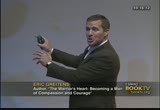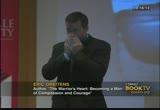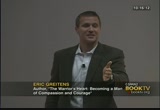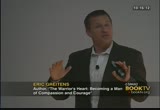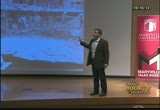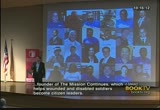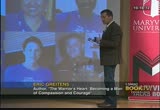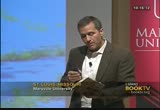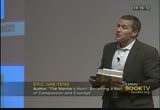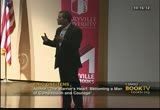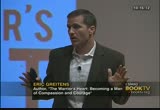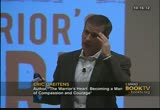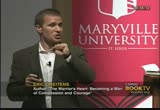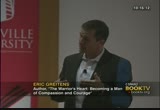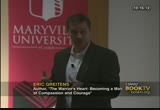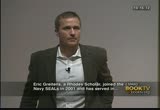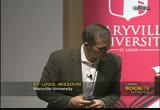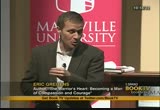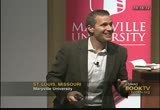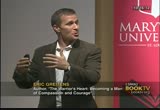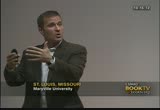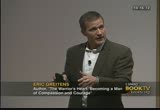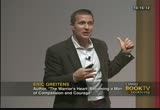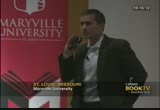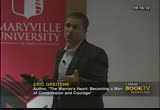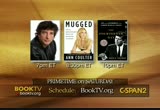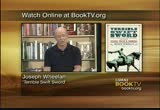tv Book TV CSPAN October 27, 2012 10:00am-11:00am EDT
10:00 am
stopped in austin, texas for coverage of the seventeenth annual texas book festival. from 11:00 to 6:00 eastern hear from david westin on his 13 years in the network news business. douglas brinkley on walter cronkite and michael gillett on texas native lbj and lady bird johnson. sunday from noon to 6:00 each w brand on ulysses s. grant, infiltrating mexico's drug cartel and robert draper inside the house of representatives. the texas book festival live this weekend on booktv on c-span2. ..
10:01 am
[applause] >> well, one of the things that's fun for me about being here tonight, as gary mentioned, i am from san louis. it's always good to do these things in san louis. i have some wonderful people who shape my life in the front row. my second grade teacher. please help me to welcome that. [applause] and i know that if this book can have the kind of affect on just one person's life that pat and my other teachers had on me, this will be a very successful book. thank you very much for being matter tonight. i will begin the book reading cry from the very beginning where i asked jack people to imagine themselves in the navy seals training. this is out its starts.
10:02 am
you stand in freezing water up to your chest. every muscle in your body throbs with pain. you're exhausted beyond anything you could ever imagine, and all around you the night air carries the curses and groans of others who are getting it out like you, trying to survive the night. most won't. you know the statistics. maybe one in ten will make it through this we can survive hours, days of the punishment required to become a navy s.e.a.l. that water is dark around you, but you can make out lights on the beach. roy member your instructors words as the center toward the horizon, their voices booming over the bull horn. say goodnight to the sun. the night is going to be a very, very long night. your imagine another hundred hours of this. you see yourself plunging over and over into the icy water pulling yourself out again. you imagine endless repetition of ceps, flutter kicks, pushups.
10:03 am
surf torture, they call it. they leave here in freezing water. not just for a few minutes, but for five more days. five days of struggle and uncertainty. five days of physical and emotional torment make the separation. in the distance of bellsouth's three times, and then another three times. if you hear the bell you know that another student has chosen to quit. a voice rises and falls taunting you, inviting you to do the same could no and you can avoid the rush later. one by one, sometimes in clusters and other students surrendered. all around you, all around you they climb up out of the ocean, walk up the sand hill and ring the bell. for them it is the end. the others in your crew struggled along with you, and it
10:04 am
is their companionship and strength that please you. you are there for one another. you are a team and you do not want to quit and your team. you are fifth bone tired and shivering afraid you'll never make it through the night, let alone an entire week. on short cents a brightly lit tense. others are gathered in side, palms cupping mugs a warm coffee. they are wrapped in blankets. they are born. you could be one of them. all you have to do is rise of the icy water. it's easy. since have been doing in all night. get up, get out, walked toward the bell and quit. then you could be warm and dry like the others and your stomach of the folks and you could feel your fingers and toes again. all you have to do is get up, get out, and ring the bell. what do you do?
10:05 am
now, this was just one of the tough choices that we had to make when we were in the navy seals training -- navy s.e.a.l. training. and one of the things we talk about when you have to make tough choices, we talk about how you make tough choices on the front line. in the military will we talk of the front line, we talk about it as the place where you come in contact with the enemy. the place where you are most challenged. yet the fact is that every person and every young person also has in their life. for your people that fall lion is a place where they are challenged. a place where they come up against your, come up against hardship, against difficulty. and on the front line is important for young people to find ways to navigate those challenges. and what i know is that if they make the right kinds of choices on the frontline that all of them have an opportunity to create themselves.
10:06 am
we create ourselves because on the front line is the place where we can grow. if we make the right choices we all have an opportunity to become people of compassion. we all have an opportunity to become people of courage, and we also all have an opportunity if we make the right choices on the front line, we all have an opportunity to develop gifts, strengths, to develop our ability so that we can find a way to be of service to the people around us. and if you think about how you make decisions, one of the things that we do in the navy teefourteen is we have an analogy for how you make tough choices in your life. we talk about how you use a compass. what we know is that if you take a compass and point it in a particular direction you can walk all day. you might walk over mountains, walk through a forest worker does it. what happens is at the end of the date you end up in one
10:07 am
particular place. we also know that if at the beginning of that journey you make a decision that you are going to make a change of course and you might make a change of course of just one or 2 degrees in your life, but you decide you make a change of course and start to walk that you pass and you can walk in over mountains, through a forest, through a desert. what happens is at the end of the date you end up in a completely different place. and we know that the young men and women who we are working with today and for those who are going to our rita the warriors heart is what i know that for them there at a place where they are facing a front-line. they are challenged. hardships and difficulties and they have to act with courage. i have written the warriors are so that at this place in their life they can think about how they make choices in their life so that over time they can make choices so that they can create themselves so that they can
10:08 am
become people of compassion, make choices that allow them to develop courage in their life but also make choices so that they all get to a place where they can figure out how they can use their own abilities, develop their own talents, develop their own strength so that they can be of service to the people around him. now, in our lives none of this happens on a round. as i mentioned, not only is that here, but in the book, and i dedicate this book to my teachers to i had in the elementary school, parkway junior high and park, north high-school all shapes my life. and what i know for sure is that in our lives we all have to have the right kind of teachers and role models. i tried to put in lots of stories about teachers and role models to get help young people think about how we make these tough decisions on our own front-line. one of the people he shared my
10:09 am
life that i read about and the warriors art was one of my mentors, a guy named bruce carp who ran a program called youth leaders said lewis. he invited me to go down to work at a homeless shelter in downtown st. louis. i had done a lot of community service work before and had been down and done some things at a homeless shelter. what he said to me, that only will you go down to the homeless shelter. i'm going to take you and other students down and what i will ask you to do is actually spent the night there. i want you to spend the night in the homeless shelter. what he said was powerful. it's important for you to understand how all of your neighbors are living. it's important for you to understand how all of your neighbors are living. one of the things that i tried to do is ask kids to step into the shoes of rwanda's refugee children, the shoes of children of the street and bolivia, step into the shoes of navy s.e.a.l.
10:10 am
think about the kind of choices so that they can exercise their moral imagination and think about the world. one of the other things that persisted that was really powerful for me was that he also said to me, it's important for you to understand how your neighbors are living because you can do something about it. we will was so nice is that he did not say you can do something about this after you graduate from high school. tsa you can do something about this after you graduate from college. he did not say you can do something about this after you turn 30. the message was that you can do something about it right now. part of the message i want to give to kids in "the warrior's heart" is also that they have the ability right now to make a difference in their schools, have the ability right now to make a difference in their communities and they have an ability right now to use their strengths and talents to make a difference in the world. i know from the experience that i had during international humanitarian work the incredible difference that young people can make in their world.
10:11 am
one of the stores that i've read about and the warriors guard was my experience working with bosnian refugees. so the photograph that i took here i took when i was 20 years old. the photograph of bosnian refugees just as they stepped off of the buses into the sea refugee camp. and at the moment you're looking at everyone here, they have all lost every material possessions ever owned. not only have many of them whatever material position, some of them have also lost friends and family. and in "the warrior's heart" as get people to think about what it would be like if you had suddenly lost her home. think about what it would be like if you lost your car, everything in your room, everything that you own and had to get on the bus and go into a refugee camp and start a new life. one of the things that i know is that it was hard for a lot of young people in the refugee camps. there were at a place in their life, these young people, there were at a place where ron this
10:12 am
new front line. one of the things that i saw was that in the camp and was often really hard for the young people because they felt like their lives have been cut short. a tremendously difficult. they lost their homes, all the material possessions, friends and family and felt like their life had been cut short. yet they did not yet feel like anybody else was counting on them. it did not feel like they had any social purpose and the camp. the kids to i saw who were doing the best in the refugee camp were often the young people, sometimes 12, 13 he made a decision that there were going to volunteer. one of the things that they started to do is work with some of the youngest kids in the camp . you think for a second. what it's like to make sure that we are able to provide a quality education to every single young child in st. louis. think about how difficult that is. then think about what that challenges like in a refugee
10:13 am
camp. what that's like, no class from delano curriculum, no buildings. part of the reason why they were able to do that successfully in the refugee camp was because a lot of young people stepped forward and said, i'm going to find a way to volunteer and served. one of the lessons in "the warrior's heart" is that you are and a place in your life where things are hard and difficult and you might be afraid and there is hardship, you actually become stronger. when you find ways to be of service in your school, find ways to be of service in your community and with to be of service in the world, not only does that help the people around you, but it makes you stronger. and what was need for me to see was how they started to take off and the refugee camp. one board 15 years old, and he had no budget, no supplies, all he had was one soccer ball. what he would do every afternoon is take the soccer ball out. an open field near the camp, and he set up a soccer team for some
10:14 am
of the youngest kids in the camp and one of the messages that we want to get across is that the message for young people is that you can find a way to serve right now in this tough place. if all you have is a soccer ball there is still a way for you to serve. all of us can find a way, no matter what the circumstances that we find ourselves in. we can all find a way to make a contribution. now, i walked young leaders to rollout of the adventures that i had in my own life, and one of the places i taken to is rwanda. 1995, a couple of months after the genocide or 800,000 to a million people were killed. i went to rwanda to work specifically with unaccompanied children. these were kids who have lost their parents during the genocide or had been separated from their parents during the refugee movement. again, i asked in the years to think about their own experience
10:15 am
and to imagine themselves, if they were a rwandan refugee child who was living together, who was living in the camp. these four boys were part of a group of 15 boys that were all living together and alone in the refugee camp. as to the readers to imagine themselves as part of this group . you have learned what you need to do to survive. you have created a shelter for yourself. you're healthier than so many others. you grab food and water when it's given out, citing similar for all of the supply runs dry. one day you lie in the shadows beneath a blue tarp that stands between you and the blazing sun. you hear a sound. you roll over and press your hands against her years, but it reaches you still. it is a little child crying. the rise and leave the comfort of the shade. in front of your shelter stand to little boys.
10:16 am
they are barely closed and it tears leave shining trails in the dust on the faces. they stand with their mouths open like baby birds crying and scared. you could take them into your shelter and share what of you have. you could help dry their tears to me give them sips of water, make sure they are not injured, but you have yourself to worry about. you have yourself to worry about, and everything you give to them is something you take from yourself. if you don't offer, they might find help elsewhere or they might die. the sun beats down hard. they stand and look at you. you could yell at them and scare them away or you could stand aside and let the men. what do you do? what do you do? we ask young people to imagine themselves in that tough situation and think about what they would do. and one of the messages we have four young leaders is that many of them might not necessarily be in a situation right now where
10:17 am
they have to make life-and-death decisions about actually saving other people's lives, but all of them are in a position today where what they do can shape the lives of other people around him and in their classroom, their schools, their communities, they all have an opportunity to make a difference in the lives of other people. the way that they do that, one of the ways that we suggest they do that is to think about some of the lessons that i learned from these boys. this group of 15 boys was led by a 16 year-old. one of the things that i write about in the book is that when i ask that 16-year-old boy to tell me about all of the other kids in the group, and never forget. he says to me, this one as powerful a fire and cooking. powerful. they like him. this one as powerful singing. as you went around the group he describes every single boy as being powerful and something. and i think there i thought part of the power of his achievement, what that 16 year-old boy was
10:18 am
able to do to keep 15 boys together and a live through months of disease and deprivation in camp. and the only reason i think why he was able to do that so successfully at this place in his life where he was facing difficulty in pain and hardship and he was afraid, the only reason he was able to walk that path was because for him he knew that he did not have to walk alone. walking. in his case, these other young boys. he had the true humility that allowed him to look at every single person around him and see that every single person could contribute in some way. that was part of the power of his service at that moment. now, for me in my own journey as we take young leaders through one of the things as we leave rwanda and places like bolivia and cambodia were added international humanitarian work, eventually i take them into the navy s.e.a.l. training. for me when i when -- i left the
10:19 am
humanitarian work and went to the navy s.e.a.l. training i went to a place called but, basic underwater demolition seals training. some of you might have heard of it. the basic navy s.e.a.l. training often considered to be the heart of the military training. in my class we started with over 220 people in our results class. by the time we graduated we were down 21. now, what happens over the course of that training is that every single day they hit you with the different test or a different challenge. so i take young leaders through some of those challenges. they ask you in the very first week to come up to the edge of the pool, jump in, to a front flap under water and then swim 50 meters underwater. it's one of the first challenges in the first week of the training. later they asked you to swim down 50 feet, tie knot, and come back up. they have you do firemen drills
10:20 am
were you to somebody else over your shoulder and run with them down the beach through soft sand or throw somebody over your shoulder and run with them through a path in the mountains. small rubber boats on jagged rocks, oftentimes in the middle of the night. there is one evolution call drown proofing. what happens is the time of your feet together and tie your hands behind your back. and with your feet tied together in your hands tied behind your back yet to jump into the pool. in with your feet to ibm -- with your feet tied to get you have to swim 50 meters. you come back from selling 15 years in the ninth foot section of the pool and what they ask you to do is blow all the arab year-long sensing down to the bottom of the pool. you grab a quick breath of air in and sink back down. the next thing that they asked us to do when they first told us that we had to do it actually i laughed out loud because i thought there were kidding. they said the next thing were going to do is take your face mask and rode in the water.
10:21 am
it's going to sink down to the bottom of the 9-foot section. and with your feet tied together in your hand tied behind your back yard to swim down to the bottom of the pool, grab the face mask with your teeth and swam back up to the surface and back down five more times. when you have to do things like this the instructors would always call them evolution. the instructors would say, the next evolution is drown proofing or the next evolution is the 50-meter under water swim or the next evolution is of four mile tundra and soft sand, the next evolution is a 2-mile swim, and i had no idea why there are calling and evolutions. why don't you just called in the next test for the next challenge for the next really painful thing that we have to do. and finally one of the instructors explain to me why they call the evolutions. what they said was, every time you're on the front line and you make a decision, you make a voluntary decision that you are
10:22 am
going to confront your fear what happens is that your character evolves. every time you make a voluntary decision the you're going to move through pain in order to serve a larger purpose your character falls. every time you make a voluntary decision that you're going to do something hard, something difficult, something where you might even suffer in order to become stronger, what happens is that your character falls. the idea was that they would create evolution after resolution after resolution so that eventually all of us to get to a place where our characters have evolved and we could become navy s.e.a.l. and then as navy s.e.a.l. we could find a way to be of service to the people around us. and what i know for young people and this is true for all of us, that if we think about what it actually takes to make the tough choices and to walk this path so that we can develop courage and
10:23 am
compassion and develop our own abilities to be of service to other people, what i know is that when we walked this path it's going to be hard. and we are not going to be successful every day. its point to be difficult and we will run into hardships and be afraid. what i also know is that if we move through that, if we move through that year we become courageous. if we move through pain we achieved wisdom. if we move through where we suffer we become stronger. every single young person can, through a process of evolution, come to a place with develop strength, courage, wisdom, and they can use that strength and that courage and that was some to be of service to the people around them. now, you continue with the turning, the pinnacle of the s.e.a.l. training comes in a week that is considered to be the hardest week of the hardest military training in the world. and it's a week that's called hell week, and what happens is that the average class least for a total of to the five hours
10:24 am
over the course of the entire returning. and as you're going through the training they have you doing things like physical trading on the beach with lots away over a hundred pounds, running races with your teams in and out of the ocean, the water off the coast of san diego regardless of season is often in the low to mid 50's's. make sure you have plenty of time to appreciate the water. they have the ring the obstacle course throughout the week. and it is a week of constant chaos and change and challenge and confusion. and if you ever want to quit at any time in hell week all you have to do, at any time all you have to do is raise your hand and say i quit or you can raise your hand and say id0r, draw upon request, or they're is a small bell, and if you walk over to that bill and bring it three times it means the quick. no, what the instructors will do is actually rig up this contraption so that wherever the
10:25 am
class when the bill would follow them. and if you ask the instructor is why you do that, why you fall was a room with the bell and make sure that it's never more than 30 or 40 yards away from the class, with the instructors will tell you is, they will say, we do that because we believe in excellent customer service. [laughter] so they follow you around with the spell as you go through hell week, and i can remember what was for our class the hardest moment of the hardest week of the hardest military training in the world, and that moment came at the beginning of the second night, so for a lot of people the adrenaline had carried them through the first night in the next day. we arrive at the beginning of the second night in rethinking, and more tired and more exhausted and more be and then i have ever been in my entire life . rethinking, i cannot believe this is only the beginning of the second night. at which point you hear one of the instructors get on their bull horns and say, that's
10:26 am
right, gentlemen, it's only the beginning of the second night. and what they did then at the beginning of the second night was took the class up and learn this up on the beach to watch as the sun was setting. they'll learn this up on the beach to watch as the sun was setting. and as the sun was going down to the instructor's came out and got on the bull horns and started to get inside people's minds. they said say goodnight to the sun, gentlemen. tonight is going to be the most painful night of your lives. watching the sun. this week just gets more miserable as we go. and i can remember, i was standing there, and i saw out of the core of my night that something broken the class. and people started running for the bell. ready for it. you hear it going off. we had more people could our class at that moment then quit
10:27 am
at any other time in all the training. this is what was amazing about that moment. all the difficult things they asked us to do, some 50 meters underwater, down 50 feet anti not, tie your feet together and your hands behind your back and making japan. who would have thought that the hardest moments of the hardest week of the hardest military training in the world would come when all they have actually asked us to do was to stand on the beach and watch the sunset. that is all we had to do at that moment, stand on the beach and watch the sunset. kaj always ask, how many times have you been able to go out and stand and watch a sunset. every single one of the raises their hand and they know that they can do it. every one of them can stand and watch. what was so interesting about this moment was that i told you, over 220 people up to 21 to my count on one hand the number of people who i saw.
10:28 am
>> when there were actually doing something. what would happen is people would quit, and they started to think about how hard it was going to be. that is when people would quit. when they started to imagine how difficult it was going to be, that is when people quit. one of the things that we know is a case, when we think about having to do things and we are afraid of in our life, what it takes to challenge ourselves on the front lines and move through hardship and difficulty, one of the lessons is that one of the things we need to do is find a way to take it one step at a time. if we can find a way and confront our fears and to our work all of us can find a way to make it through, find people -- become people of compassion and find ways to be of service. now, for me when i finished with the navy seals training i deployed 4 tons, first went to
10:29 am
afghanistan and in the southeast asia and then to the horn of africa and then finally to a rock. and i talked a little bit about my experience where i was on the front line. and in march of 2007i was serving as a commander. as the commander of the targeting sell my unit's mission was to capture mid-senior level leaders in and around the city of collusion. in march of 2007 my team came under attack with a mortar attack in the morning, and after several more rounds one of what happened was that there was a suicide truck on a one-off. when the suicide truck bomb went off what happened was it ended up taking out the entire western wall of barbaric. and that they, later that day i was taken to the surgical hospital with minor injuries. i was treated there. seventy-two hours later i was able to return to full duty.
10:30 am
some of my friends were heard a lot worse than i was one of the things that i say to young people is that for a lot of the people who i went to visit to, when they came home i saw that they were on this new front line. these were veterans, proud, strong people who knew they served in places like afghanistan and came back and especially after they had been injured, there is this new place and they had to make a decision about the direction that there were going to head. they had to make a decision about how they were going to deal with pain, work through difficulty and hardship in order to find ways to continue to be of service your home. and what i found was that all the men and women who i talk with when i came home, i went to bethesda naval hospital and started talking with him in and women. i talked with people who have lost both of their legs, young men who have lost the use of unarmed, part of his right lung, another who lost most of his hearing. when i ask all of them what you want to do when you recover,
10:31 am
every single one of them said, i want to return to my unit. the reality was for a lot of those men and women there are not going to be able to return to their unit. the reality was that on this new front line all of these men and women who had come back from their service kamal of them wanted to find a way to continue to serve. and so i took my combat pay, to my friends put in money from their disability checks commander use that to start the mission continues. we started the mission continues with this intention of challenging the veterans who had come home to find ways on this new front line in communities across america to find ways to continue to serve and to continue to inspire. so we worked with men and women who came home, serious dramatic brain injury, sean donahue who had a traumatic brain injury, amanda-who was hit by a mortar round. ian smith came back with pores -- posttraumatic stress
10:32 am
disorder. serve in the united states marine corps, shot by a sniper. all of them came back. and what we share with young people when we do this work, we share with young people that there were at a place in their life when they came back and were on a new front line in many of them were afraid. it was difficult. what we did with them at the mission continues was challenged them. we challenged all of these men and women in the same way we challenge and people in "the warrior's heart," challenge and to find a way to continue to serve so that one man ended up serving at the st. louis science center. adam burt ended up setting up his own nonprofit. serve with habitat for humanity. a youth hockey coach in football coach. it at the mission continues and did an in the white house with the first lady's office for her
10:33 am
joining forces initiative. it ended up becoming a biology teacher for part of her. and what happened was for all of them, they started to serve again and took on this challenge of finding a way to continue to serve on their new frontline. and what we found ed the mission continues is that all of them have been able to serve as inspiration for young people are around the country. and i finished the book, i finish the book with this challenge for young people. you pause over the last page. you don't -- your own life feels fill the possibility. you think about the kind of story that you might tell one day about your life, your love, your service, your ventures. the road before you is long. you will wind up steep hills and down to low valleys. there will be moments of spectacular beauty along the way and times of deep pain. but as you take each step you have the opportunity to create
10:34 am
yourself to. you have the opportunity to become compassionate, to become courageous. you have the opportunity to become committed to causes greater than yourself. you will be inspired, and you will inspire others, and you will find your own unique path. the world needs you. we need all of your strength and all of your creativity, all of your heart. you can make a positive france and the lives of others. take it one step at a time, and know that it is up to you. a the world is waiting. what would you do? and my final note to all of the younger readers, i say to them, go be great. and then i offer them in the very last chapter in the very last chapter, it's called your mission. i tell them that they are at the heart of this book and that i wrote it with them in mind, and i direct all of them to a
10:35 am
mission planning guide that we set up the company's the book. young people around the country can figure out how they take their skills and their passions and their interest and they can turn the things that they love and the things that they care about into their own mission of service in their community and country. one of the things we are trying to do is help young people to what we all need to do in our lives, find their own vocation. we talk about a vocation as the place where your great joy makes the world's great need. and what we know is that if young people start at a young age to pursue these missions and to do this work that all of them can find ways in their life to create a life of purpose when they become courageous and compassionate. and we also know that this is only possible as it was possible in my life because of wonderful futures. and so we built the teachers' guide to help teachers teach this book and teach some of
10:36 am
these lessons to young people and to release spread this message that all of them are capable of creating themselves, all of them are created -- capable of making contributions. one of the most fun things that i have had a chance to do over the course of the past week is to talk with young people around the country about "the warrior's heart." from the has been a tremendous labor of love, and i'm grateful to all of you for coming up to share this day with me. thank you very much for having me. [applause] >> thank you. [applause] >> i think that we have time for some -- we have time for some questions, so i would be happy to take some questions from the audience. >> how does the humanitarian and situations of tremendous loss, particularly with young people become inspired to pursue a
10:37 am
mission as a highly trained military asset for the u.s. army or for the u.s. navy? >> a great, great question. part of it was -- in the right about this in the book. there was one moment when i was in bosnia and i was actually in a shelter in a refugee camp. i was with one man who had his own family that had suffered tremendously. i was in the shelter with him, and i remember he said to me. he said to my appreciate the fact you are here. don't get me wrong. they appreciate the fact there is a shelter for my family and i appreciate the fact that my kids can go to a kindergarten and i'm glad there is food here. he said if people really cared about us there would be willing to protect this. in that it know what to say to him at the time. i was on the 20 years old, but remember reflecting on that later and realizing that what he said was true. that if there is anything in our life that we really do love, anything that we care about, we are willing to respond to it, of
10:38 am
course with care and compassion, but it's also the case that the things that we care about in our lives, the things that we love, we are also willing to act with courage and willing to protect people and willing to love them in that way. so i started to think about what it meant to care of something and to live a life with both compassion and courage, and i became convinced during my time in bosnia and rwanda that there were times when people with strength needed to step forward and use that strength in order to protect other people, and that is what got me thinking about the united states military i was very fortunate, both of my grandfather said served in world war ii. i thought about what they had done and the previous generations have done for me which led me to think about the military. finally i joined the military relatively late, 26 years old, but i still harbor desires that i have had since i was will stage, desires that i had to jump out of planes into scuba dive into all those things.
10:39 am
all of those things change my path. >> i enjoyed your speech. after the attack the john mccain of writing the book in regards to that navy s.e.a.l. about the attack. of threats and he and his family you have been a retired navy s.e.a.l. as this happens to you? >> sir, it has not. what happened in that case was that there were a very specific mission and concerns about very specific classified and sensitive information that was actually contained in that book. of course he was part of that mission and he was 65 there were concerns about threats against him. what we have done in "the warrior's heart" and also in this is all the of permission we have shared is publicly available information about what happens in that navy s.e.a.l. training, but we put it together in such a way that people can
10:40 am
think that just about what navy s.e.a.l. do and what they live through but how they reflect on that and make it part of their own lives as they think about their own challenges. and so because the books are different in now way we have not had any -- i have not had any problems. in fact, i've had a tremendous amount of support. so it has been a lot of fun. yes, ma'am. >> how many navy s.e.a.l. are there? when did the navy found the s.e.a.l. >> great. so on active duty right now the navy s.e.a.l. are the smallest special operations force. at any time is probably between two and 3,000 actual navy s.e.a.l. and they are not only serving in platoons on the front lines by working in places like the pentagon, headquarters command like central command in afghanistan and some of those of course. and so there are probably about 2000-3000. they were started on january 1st 1962 by president john f. kennedy.
10:41 am
and the reason why he started them is that he wanted to have a force -- s.e.a.l. is for sea, air, and land commando. what president in the one the do is have a force of people, a dedicated and highly trained force that he could put into difficult situations to could not only respond tactically and using physical courage but could also respondent could use their minds and the thoughtful about working in some very difficult and dangerous situations, and his theory, the international relations. let's the development was called flexible response. the idea was that the united states it to be able to respond in a flexible manner, not just using nuclear weapons which was kind of that. the time. we need to be able to respond in a flexible manner to any threat which is what led to the development of the teefourteen. you're welcome. yes, sir kaynine. [inaudible question] >> the question was, what i care to comment on the latest book about the bin laden rate.
10:42 am
i don't think that that was a good book to write. and until you why. i have tremendous respect for the admiral, you may know, the four-star navy seal admiral in charge of special operations command. he took over from another four-star navy s.e.a.l. in charge of special operations command, and one of the things that he said was, there were some classified or sensitive information in that book, and it is really important that we always keep that classified and sensitive information secret so that we can protect other navy s.e.a.l. when they conduct these operations. i think the other thing that people in the s.e.a.l. community feel is that it's obviously fine to write a book. my friend mark latrell has written a book. there are others who have written books to let people know about the forces they are supporting, but this particular book was about an operation that was a team operation. and i think that the concern was, something that an entire
10:43 am
team did. because it was a team operation, if the store was going to come out it should have been a story it cannot from the team rather than from just one person. so that was kind of sum up my reflections on the book thus far. did you have a question? to okay. we'll do you next. >> first, thank you for your service. >> you're very welcome. >> the question is, the you think that the details you go into on the s.e.a.l. training, have you had any negative feedback from the community, anything about pulling the curtain back, taking the mystique out of the boss s.e.a.l. >> so the answer is, we have actually had a lot of positive comments from people who are in the s.e.a.l. community about this aspect of the training. so the four-star navy s.e.a.l. admiral, shared the book with him ahead of time. one of the things that we found is that all of the things that i talk about are in the basic
10:44 am
training. the basic underwater demolition s.e.a.l. training. discovery channel documentary that have been done on this. lots of other videos that have been produced. when it comes to the advanced combat training, will recall the 54 qualification training, you noticed that chapter is much shorter. it's much slower because of exactly this point. it's important that a lot of the specific tactics, techniques, and procedures all remain secret . this basic need the s.e.a.l. training is the grueling part of the training, the part where a lot of people are weeded out, and it's also the part where there are a lot of lessons imbedded in there about what it takes to think outside of your own pain and to think about the fact that there are other people counting a new, think about what it takes to move through fear and to become courageous. but i have tried to do is share those pieces of the training and make sure that all of that advanced training in specific tactics, techniques and procedures remain secret.
10:45 am
>> to you have kids? [laughter] >> what is your name? >> my name is kate went. >> caitlin, that is so great as you test. you know what's funny, i think the you just asked my mom's question. my mom is right over there, and i think that you read her mind. this is the most important question probably that you cast actually. so i actually do not have kids said. my wife this year. that's my wife. one day, one day, probably soon, we are definitely planning to do that and look for to that, right now i don't actually have kids. >> if you had kids would you like them to be navy s.e.a.l.? >> that is a great question. >> , if i had kids when i want them to be navy s.e.a.l.? so, for me the thing that would be most important for my kids is that they do what they would love to do. that is the thing that would be most important for me. if they came to me and told me that this is what they wanted to
10:46 am
do, that they wanted to be in navy s.e.a.l., i would support them and incurred cent in whatever way that i could, but there are lots of different ways surf. and so what i would encourage them to do, and i think that every kid should find their own weight to be of service, but if this is what they want to do i would encourage and support them >> thank you. >> you're welcome. thank you. [applause] >> did you have a question, sir? >> how long is the s.e.a.l. training? >> what is your name? >> loving. >> logan, the s.e.a.l. training is about one year and a half to go to the basic steel trading. i joined the military on january 20th 2001. officially became a navy s.e.a.l. on july 3rd 2002. by the time i went through officer candidate school, basic training, and the advanced seals training it was about a year-and-a-half. one of the things that we do is we always talk about always been in training.
10:47 am
so even when you get what we call the trident which is that simple right up there, even when you put that on your chest and you have officially become a navy s.e.a.l. for all of us the training never ends. we always in our life have to be learning, we always have to be reading, we always have training and study. and that is part of the commitment of being a navy s.e.a.l. you're actually going to dedicate your life to finding ways to continue to grow and to learn. thank you. >> what advice to you have for young people? >> wonderful. what was your name? in. silicon's question, what advice to i have for young people who are aspiring to beat navy s.e.a.l.? one of the things that i always say to young people who are aspiring, it's really important for them to dedicate themselves to doing really well in school. one of the things that we know about the s.e.a.l. teams is that it is actually the most highly educated force in the united states military.
10:48 am
what we're looking for in the s.e.a.l. teams are not just people of physical courage and technical proficiency. we're also looking for people who can be thoughtful. i always emphasized that kids should spend a lot of time on their studies and develop their minds and develop those intellectual habits and their academic studies. that's really important. second, i encouraging people to get involved in athletics. in athletics to find ways, again, to run up against hardships to learn from coaches, mentors, room models. that is the second thing. the third thing that i always encourage young people to do is to find a way to start making a difference, find a way to start serving now. i believe that if young people can find a way to start serving in their community that eventually what happens is they start building habits and they will build the habits of team work. bill the habits of learning what it takes to inspire people in difficult circumstances, the habits that it takes to actually put them in a place where they
10:49 am
can one day the nikkei four. i am inspired by young people like will who decided that he was going to create his own mission. he did. he created his own mission and went out and took his acts and chopped firewood and was able to support the work that we do at the mission continues in a tremendous weight, so i always encourage and people to spend time studying primitive involved in athletics to develop themselves physically and find ways to continue to serve in their community. >> physical training. you mentioned post-traumatic stress disorder. [inaudible question] >> creek question. we talk a lot about the physical training. how do we actually build psychological strength? how do we build emotional strength so that when people are going through these difficult circumstances they are better
10:50 am
prepared to deal with situations that might lead to post-traumatic stress disorder and to make it through. one of the things that we found that is really important for dealing with post-traumatic stress disorder is that it is important for people to feel connected. when people come home and feel connected and feel understood, they feel understood by their family, by their community, by their team, and helps them to deal with some of the symptoms of post-traumatic stress disorder. one of the things that is so difficult now is that if you add up every single person who has set foot in afghanistan, you add up all the people who set foot to over the course of 11 years, it still adds up to less than 1 percent of the population. so what happens a lot of times is that men and women will come back from serving. in my return to their community, and they find there in a place where no one else has served. certainly no one else has been on the front line or experience to combat and they can actually feel isolated. some one of the things that we have to do is make sure the people are connected to their
10:51 am
families, their teammates, the community. that is one thing that we have to do. the second thing that we have found especially at the mission continues is that one of the ways to actually step out of those difficult moments is to create that new mission so that you are not stuck in a place where you are worried about what has happened in you're not stuck in the past. will we need to do is create a new mission for people when they come home. we found for our fellows, some of whom were in very difficult situations, some of whom were even considering committing suicide, some of whom had serious cases of post traumatic stress disorder, walking a batter now looking for rifles and ready to bed, looking a bit sweats, having trouble being and college campuses, what happened was when they felt like there are needed again, when they felt like there was a mission again for them and they started to get involved in their communities and a positive way what happened was they were able to refocus a lot of that mental energy not on the past but the future. and as they started to do that
10:52 am
they found ways to process what had happened, and we see the manifestation of some of those symptoms of post-traumatic stress disorder actually go down over time. the third and final thing that we need to do for young men and women who have come home and facing this is at the know that this is normal. it is an absolutely normal thing to have an abnormal reaction to an abnormal situation. in the situation of extraordinary violence in difficulty and hardship is absolutely normal to come back and to not want to have somebody stand behind you and not want to be sitting in a restaurant in the middle of up to people. that's in your reaction. one of the things we have to do is make sure that they know they are -- this is a normal place and still let them know that there are many people who have been able and have found ways to work through this. so we have to give them hope by letting them know that this is normal and that they are models, people who have done this successfully. if we can do all of that, keep people connected to let another is a sense of purpose, let them know it is all right in to
10:53 am
create models of people who have made successful transitions we find that a lot of people, even in very severe cases are able to beat the systems and overcome the condition and find ways to lead fulfilling lives again back here home. >> we have time for one more question. >> sure. >> i was driving to work today and on npr they had a small segment on a question that ought they would ask the candidates tonight. they speculated that they would ask what else to be done to improve lives of returning veterans and to build on that question, i'm just curious in addition to dealing with posttraumatic stress and your program in mission continues, how would you like to see the candid it's answer that question because you have obviously done about it a great deal? what else is lacking the you would like to see the mets tonight? >> a great question. one of the things that is lacking in the country is that we have not really put the message out to the american
10:54 am
public about what an incredible asset this group of veterans are were coming home. so we have a almost one-half million veterans. as they come home what is important for us to recognize is that these men and women are bringing the skills that come from that work, tremendous teamwork skills that come from a deployment. in no way takes to inspire people in difficult circumstances and they can all be assets to the community. we need to get that message out that veterans should be welcomed home as assets. too often when people read about veterans or think about veterans that think immediately about posttraumatic stress disorder, traumatic brain injury. they might think about suicide, unemployment. we immediately start to focus on the issues and problems, and we have found is that if we start to recognize veterans as assets and welcome them home in the wake and ask them to continue their mission as a public service that all of them not only rebuild a sense of purpose and now lives but they also become stronger by doing that,
10:55 am
so that is one of the things that i would love to see happen in the country, and that is part of the conversation i think we should all have here as fellow citizens. >> thank you very much. thank you very much for coming tonight. [applause] >> you're watching book tv on c-span2. forty-eight hours of nonfiction authors and books every weekend. >> you're watching book tv on c-span2. here's a look at our prime-time lineup for tonight, beginning at 7:00 p.m. eastern
10:56 am
>> the time the civil war ended sheridan was sometimes referred to as the left hand of grant, the left hand. he was ten years younger than grant and sherman. he was a dynamo, inspired his men with his intensity and by his personal lead. he led from the front, but he was also a careful planner. yet he was willing to promptly act on a plan, and once it was made and he was willing to change it if the conditions changed on the battlefield. but during the war sheridan became a household name because of his great victories in the shenandoah valley, especially at cedar creek. and for waging what was called a
10:57 am
total war there. he was one of grant's most dependable generals, so much so that during the closing days of the war sheridan became the de facto commander of the army of the potomac. few would dispute that sheridan was the most aggressive commanding general that the union had. like grant and sherman, sheridan first spot in the war's western theater at stone's river, tennessee. sheridan's alertness and kent tenacity saved the army from annihilation on the last date of 1862. his division stormed missionary ridge in november 1863. in march 1864 grant brought sheridan east with him the command the army of the potomac cavalry corps. sheridan spent the last year of the war in virginia. after the war sheridan carried
10:58 am
out the government's reconstruction policies in louisiana and texas. he waged a cold war on the mexican border. during the plains indian wars sheridan was the army's top indian fighter. eventually he became commander in chief of the army and surprisingly sheridan save yellowstone national park from exploitation. sheridan grew up in ohio and graduated from west point in 1853. when the civil war began in 1861 sheridan was an obscure 30 year-old infantry captain serving in the oregon territory. grant first recognized sheridan's abilities in 1862 when sheridan was commanding a cavalry brigade that defeated a larger rebel force in mississippi three months after shiloh.
10:59 am
in chattanooga in november 1863 grant watched sheridan and his division storm missionary ridge and then pursue it the confederates for hours when no one else did. grant knew then that sheridan was much like him, someone who would act promptly, who would fight always come into would never quit. >> you can watch this and other programs online at booktv.org. >> and now from the texas book festival in austin, we bring you seven hours of live programming. in its 17th year, the festival was founded by laura bush. here is our lineup.
114 Views
IN COLLECTIONS
CSPAN2 Television Archive
Television Archive  Television Archive News Search Service
Television Archive News Search Service 
Uploaded by TV Archive on

 Live Music Archive
Live Music Archive Librivox Free Audio
Librivox Free Audio Metropolitan Museum
Metropolitan Museum Cleveland Museum of Art
Cleveland Museum of Art Internet Arcade
Internet Arcade Console Living Room
Console Living Room Books to Borrow
Books to Borrow Open Library
Open Library TV News
TV News Understanding 9/11
Understanding 9/11